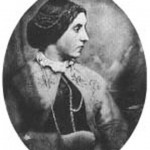by Gina Luria Walker Marie-Jeanne ‘Manon’ Phlippon Roland 1754-1793 was a martyr of the Reign of Terror during the French Revolution. As a girl she was educated in traditional Roman Catholicism but quickly began a rigorous secular self-education. She learned to read at the age of four and devoted herself to Ancient writers, especially…
Tag Archive for Europe
Antoinette Bourignon
by Veronica Cassidy Antoinette Bourignon (1616-1680) was born January 13th, 1616, to a Flemish family in Lille, France. At a time when established religions did not allow women leaders, Bourignon became one of a number of prominent female theologists – among them, Anna Maria van Schurman, with whom Bourignon exchanged letters. Bourignon claimed variously to…
Ninon de l’Enclos
by Koren Whipp Ninon de l’Enclos 1620-1705 was a French courtesan and author. She was born in Paris on 9 January 1623.[1] When l’Enclos was fourteen her father, Henri de Lenclos, deserted the family home due to legal problems. Her mother, Marie Barbe Abra de Raconis, prostituted the young Ninon to help support them.[2] As a…
Mary Leapor
Poems Upon Several Occasions (1748) by Mary Leapor by Gina Luria Walker Mary Leapor 1722–1746 was an English poet, born in Marston St. Lawrence, Northamptonshire. She was considered remarkable for being a talented working-class writer of the time. Partly self-educated, she may have received some training at a local Dame school, or at the…
Jane Lane, Lady Fisher
by Koren Whipp Jane Lane, Lady Fisher c. 1613/25[1]–1689 was the daughter of Thomas Lane and Anne Bagot of Staffordshire. She became Lady Fisher on 8 December 1662 when she married Sir Clement Fisher. Lane played a daring role in the escape of Charles II in 1651. After the Battle of Worcester in 1651 in…
Mary Armyne
Mary Armine by Frederick Hendrik van Hove, after Unknown artist line engraving, published 1683 by Veronica Cassidy Lady Mary Armyne (née Talbot), England (1594-1676) Born into a prominent Protestant family, Lady Mary Armyne, or Armine, was known for her business acumen and pious charity. She studied French, Latin, history, and theology, and was well versed…
Juliana Berners
by Sam Greenberg Juliana Berners [Bernes, Barnes, Barne] (d. c. 1460) cannot be authoritatively identified.[1] She may have been the prioress of Sopwell nunnery near St Albans in Hertfordshire, England, and the daughter of Sir James Berners of Essex .[2] The Book of St Albans, an early example of vernacular English provincial writing on practical…
Marie le Jars de Gournay
by Koren Whipp Marie le Jars de Gournay (1565-1645) French writer, editor, literary critic, translator, novelist, poet, and philosopher. She was born in Paris and raised in Gournay-sur-Aronde. Her father, Guillaume Le Jars was treasurer to King Henri III of France. In 1568 he obtained feudal rights to the Gournay estate in Picardy, and in…
Boadicea
by Gina Luria Walker Boadicea (or Boudicca) d. 60 or 61 was a queen of the Brittonic Iceni tribe (now East Anglia). Her husband, Prasutagus, ruled the Iceni and was a staunch ally of Rome. When he died, he left his kingdom jointly to his daughters and the Roman Emperor, but his will was ignored. Boudicea…
Mary Beale
by Koren Whipp Mary Beale 1632-99 was one of the most important portrait painters of 17th century England and has been described as the first professional female English painter. Beale was also celebrated for her poetical talents; versions of her psalms are included in A Paraphrase upon the Psalms of David (1667) by Dr. Samuel…
Jacqueline-Marie-Angélique Arnauld
by Gina Luria Walker Jacqueline-Marie-Angélique Arnauld, called La Mère Angélique 1591 – 1661, one of twenty children and five sisters, was given to the worldly convent of Port-Royal des Champs near Paris against her wishes, by her parents because they couldn’t afford her dowry. Abbess Johanna von Boulehart chose Angélique as her successor at the…
Laura Battiferri Ammannati
by Elizabeth A. Pallitto Laura Battiferri Ammannati (1523-1589) Born in Urbino, the illegitimate child of a nobleman, Giovanni Antonio Battiferri, and a concubine, Maddelena Coccapani of Capri, Laura was nonetheless given a decent education. She married Vittorio Sereni, then, after her died, remarried the Florentine sculptor Bartolomeo Ammannati. In 1560 she published Primo libro…
Sarra Copia Sullam
By Ruth Palmer Sarra Copia Sullam was born to a prominent Italian Jewish family in Venice around 1592. Her parents were Simon and Ricca Copia, and her sisters were Rachel (Diana) and Esther (Ster). Sarra was educated in the basics of Jewish and Italian culture, and was most likely learned in several languages, including Hebrew, Latin,…
Gaspara Stampa
by Alix Korn Gaspara Stampa was born in Padua in 1523 to her mother Cecelia and father Bartolomeo Stampa, who had been a wealthy jeweler. She had two siblings, Cassandra and Baldassare. After the death of her father in 1530, the family moved to Venice. Stampa was afforded an excellent education at the hand of Fortunio…
Wallada bint al-Mustakfi
Wallada bint al-Mustakfi (b. 1001 – d. 1080) The beautiful, free-spirited daughter of a caliph in Cordoba, Spain, Walladah wrote and inspired some of the greatest poetry of eleventh-century Andalusia. She was liberated and literary, hosting mixed-sex gatherings where she read her own bold work. Financially independent, Walladah had lovers but never married. She was…
Maria Rosa Coccia
by Marie Caruso Italian composer and teacher, Maria Rosa Coccia (1759-1833) was the first woman to achieve the qualification of Maestra di Capella (Chapel Master) of Rome. What historians have most often remembered about her were not her accomplishments, but the controversy that developed over the publication of her extemporaneous entrance exam for the Accademia di S Cecilia. …
Tullia d’Aragona
by Elizabeth Pallitto Tullia d’Aragona (c.1510-1556) was an Italian courtesan, author, and philosopher in Venice. Under her mother’s influence, Tullia had been initiated into the life of a courtesan when very young. She left us three books — her lyric Rime, her philosophical Dialogo, and her epic Il Meschino, and some urban legends. As an…
Anna Maria van Schurman
by Koren Whipp Anna Maria van Schurman (1607–1678) Born in Cologne, Germany to father, Frederik van Schurman and mother, Eva von Harf, van Shurman lived most of her life in Utrecht, Holland, where she became renowned for her knowledge of theology, philosophy, medicine, and, at least 14 languages (Dutch, German, French, English, Italian, Latin, Greek,…
Jane Loudon

by Koren Whipp Jane C. Loudon 1807-58 was a British writer best known for creating the first popular gardening manuals, providing an alternative to the specialist horticultural books of the day. Loudon was born into a wealthy family. Following her mother’s death in 1819, she and her father, Thomas Webb, a Birmingham manufacturer, traveled the continent where…
Aphra Behn
by Lindsay Smith Aphra Behn (c. 1640-89) Born in Harbledown, England, the details of Behn’s early life are unclear.[1] She may have been born to a barber and his wife[2] but there are also accounts that her father was a military man who was appointed Lieutenant-general of Surinam. [3] Some scholars of her work…
Ann Baynard
by Penelope Whitworth Ann Baynard (1672/3–97) Born in Preston, Lancashire, England. As a child she was educated by her father Edward Baynard in science, mathematics, philosophy, and classical languages and literature. By her early twenties, she had become a ‘subtle disputant’ in the ‘hard and knotty Arguments of Metaphysical Learning.’ [1] She perfected her knowledge…
Anne Bacon
by Penelope Whitworth Anne, Lady Bacon, [née Cooke] (c. 1528–1610) Probably born at Gidea Hall, Essex, England. Educated in the classical languages and the early church fathers with her brothers and sisters at home by her father Sir Anthony Cooke. Cooke was one of several humanist educators employed by Queen Katherine Parr to tutor Henry VIII’s children…
Mary Astell
By Penelope Whitworth Mary Astell (1666–1731), philosopher, rhetorician, and advocate for women’s education. She was born in Newcastle upon Tyne, England, to Peter Astell , a coal merchant, and his wife, Mary, daughter of George Errington, also a coal merchant in Newcastle.[1] Her paternal uncle, Ralph Astell, curate of St Nicholas’s, Newcastle upon Tyne, was…
Anne Askew
by Penelope Whitworth Anne Askew, [married name Kyme] (c. 1521–46), the second daughter of Sir William Askew (1489–1541) and his first wife, Elizabeth Wrottesley who was probably of the Reading Wrottesleys, though some sources say Wrottesley, Staffordshire.[1] Anne Askew is thought to have received a good education, possibly from tutors at home. She was married to…
Hertha Ayrton
by Gina Luria Walker Phoebe Sarah Mark/Hertha Ayrton (1854-1923) transformed herself into Hertha Ayrton despite opposition to her sex, religion, poverty, inferior education, and poor health from the male culture of modern Physics. Born to a struggling Jewish watchmaker from Poland and his wife in Portsea, Portsmouth, Sarah quickly gave evidence of unusual intelligence.…
Laura Bassi
by Gina Luria Walker Laura Bassi (1711–1778) Laura Bassi’s achievements as experimental scientist, professor, wife, and mother were unprecedented, even in 18th Century Italy which enjoyed a unique tradition of learned women. Bassi was unusual in being from a middleclass family. She was educated at home by a male tutor who provided traditional training in…
